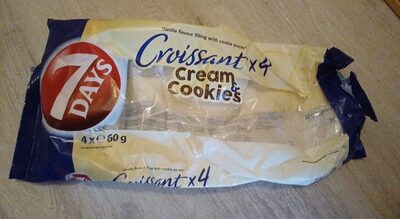
Barcode: 7622201393731
Croissant cream&cookies
DOUBTFUL
📝 Reason: Several ingredients require source verification for Halal compliance. Without full production transparency, cautious avoidance is advised for observant Muslims.
🏷️ Category: Snacks, Sweet Snacks, Sweet Pastries And Pies, Viennoiseries, Croissants
📄 Certificates: Made In The Eu
Ingredients:
Details
Understanding the Halal Status of Croissant cream&cookies
The Halal status of food products is crucial for many consumers, especially those who adhere to Islamic dietary laws. The Croissant cream&cookies product has been categorized with a ‘Doubtful’ Halal status, and in this article, we will delve into the reasons behind this classification, the specific ingredients involved, and their respective Halal compliance.
Ingredients Overview
The Croissant cream&cookies contain a variety of ingredients, some of which require careful scrutiny to ascertain their Halal status. Below is a list of the primary ingredients found in the product, along with their Halal classifications:
- Wheat flour (with added iron, calcium, niacin, thiamin) – Permissible in Islam.
- Palm oil – Permissible in Islam.
- Sugar – Permissible in Islam.
- Whole milk powder – Permissible in Islam.
- Glucose-fructose syrup – Permissible in Islam.
- Sunflower oil – Permissible in Islam.
- Yeast – Permissible in Islam.
- Emulsifiers (mono- and diglycerides of fatty acids) – Permissible in Islam.
- Sodium stearoyl-2-lactylate (E481) – Halal status is questionable; may derive from non-Halal sources.
- Skimmed milk powder – Permissible in Islam.
- Wheat gluten – Permissible in Islam.
- Iodised salt – Permissible in Islam.
- Dextrose – Permissible in Islam.
- Fat reduced cocoa powder (0.2%) – Permissible in Islam.
- Flavouring – Potential source of concern; requires further investigation.
- Preservatives (calcium propionate, E282) – Generally viewed as permissible, but sourcing matters.
- Potassium sorbate – Permissible in Islam.
- Rapeseed oil – Permissible in Islam.
- Acidity regulators (phosphoric acid, diphosphates) – Generally permissible.
- Flour treatment agents (L-cysteine, ascorbic acid) – Status uncertain; often derived from animal sources. This ingredient warrants caution.
What Makes the Halal Status ‘Doubtful’?
The term ‘Doubtful’ raises flags primarily due to specific ingredients requiring verification. Although many components are deemed permissible, those like sodium stearoyl-2-lactylate and L-cysteine pose questions about their sources. In an industry where transparency is critical, the lack of explicit information regarding the origins of these ingredients leads to uncertainty about their compliance with Halal standards.
Moreover, the potential inclusion of allergens, such as egg, peanuts, and nuts, adds to the complexity of assessing the product’s overall suitability for Halal consumers.
Brand and Certification Context
While the Croissant cream&cookies might not be produced by a specific brand that champions Halal standards, it is essential to note that it is made in the EU, where food safety regulations are stringent. However, the absence of Halal certification from reputable organizations contributes to its ‘Doubtful’ status. For observant Muslims, it is recommended to exercise caution and preferably choose products that come with a clear Halal certification.
Conclusion
In conclusion, while Croissant cream&cookies contain many permissible ingredients, caution is advised due to several components that require further scrutiny. Always check product labels and seek transparency in ingredient sourcing if you aim to comply with Halal dietary laws. Your health and adherence to your beliefs should always come first in your purchasing choices.
